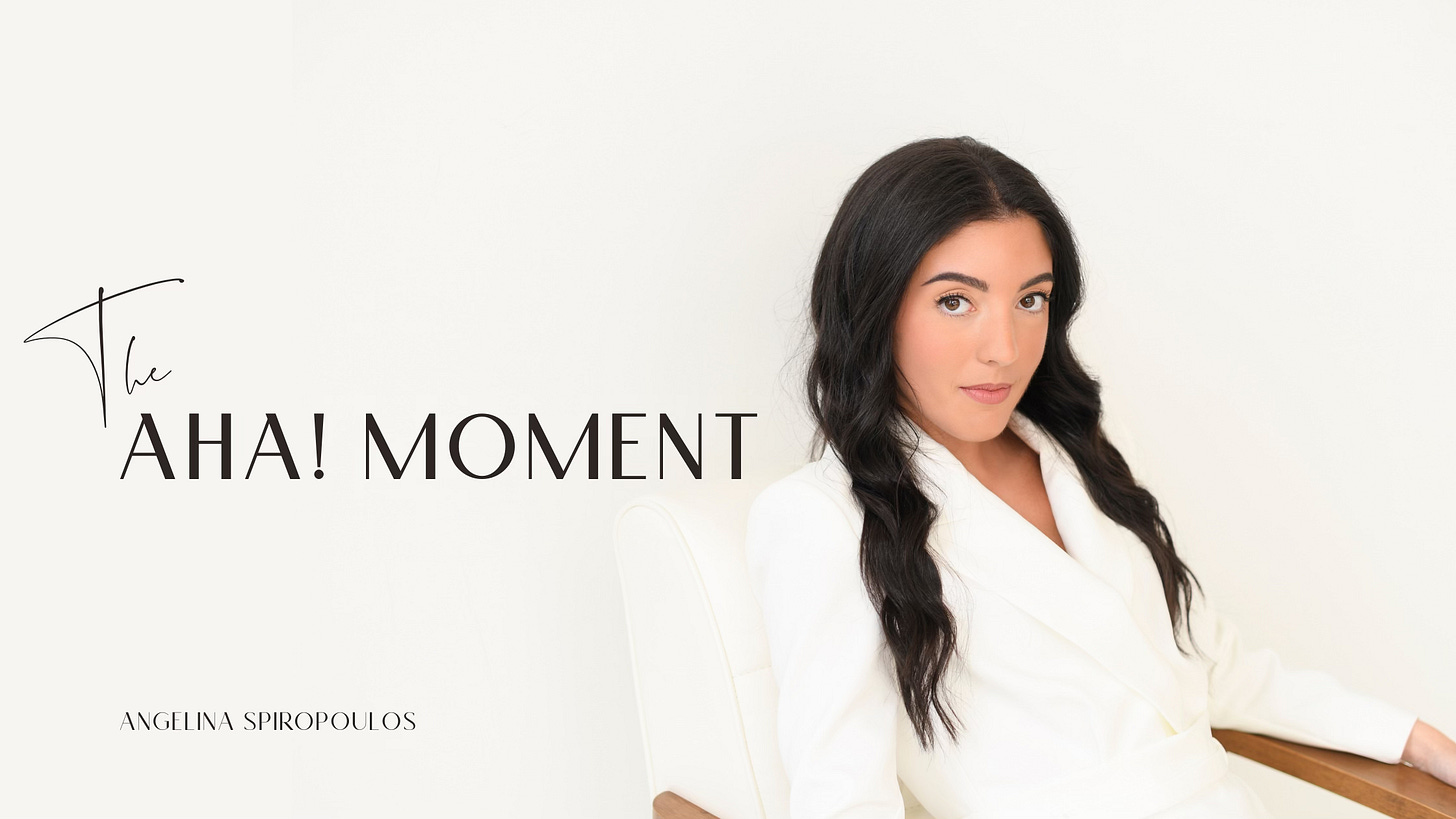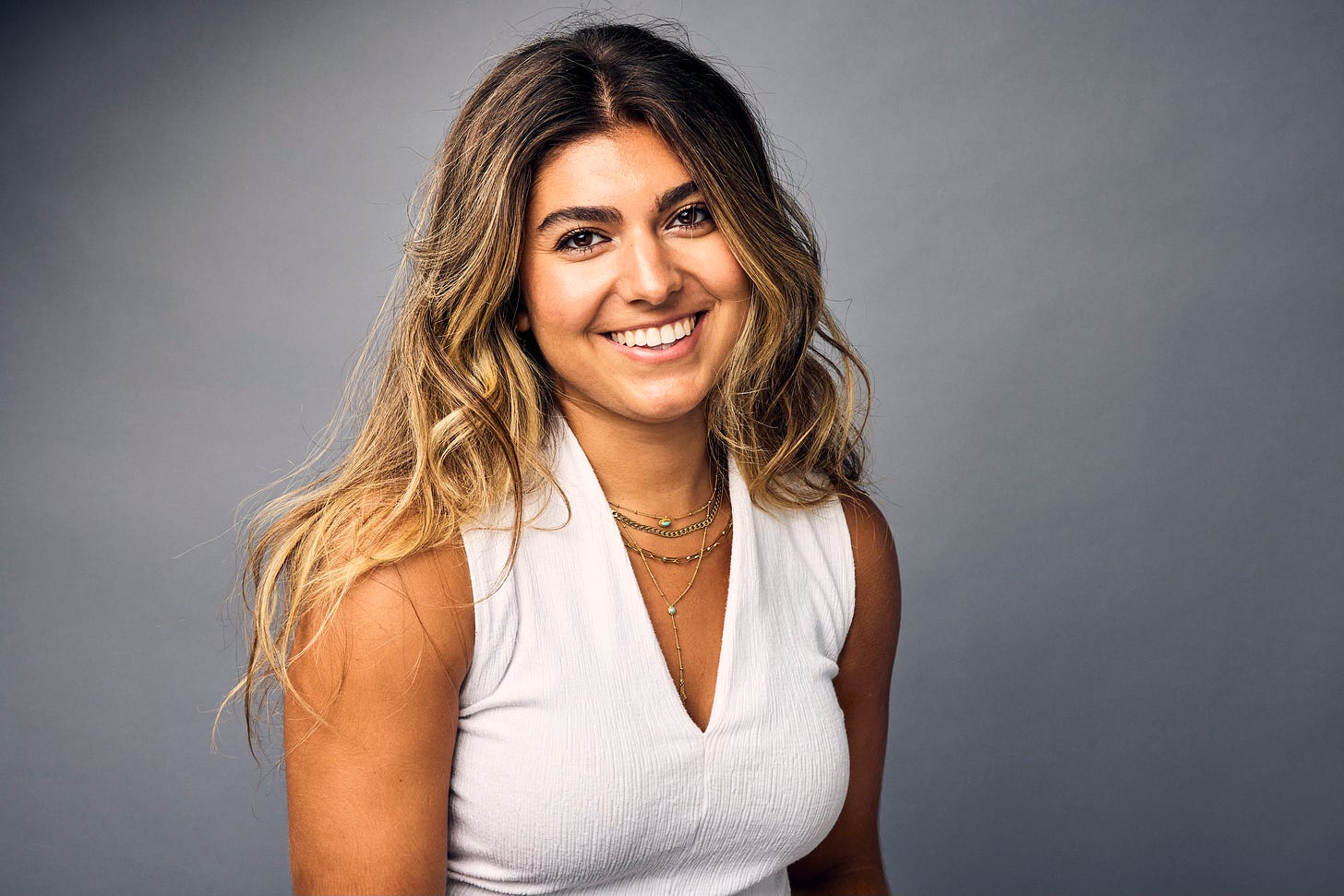In this edition of The AHA! Moment, I’m chatting with Stella Stephanopoulos: Innovation Consultant at Accenture, 200HR certified yoga instructor with CorePower and Equinox, and founder of wellness community & happiness podcast Everyday Endorphins, which focuses on the importance of finding things in life that spark joy. Stella and I unpack what inspired her to start Everyday Endorphins, the most exciting trend emerging today that is promising for the future of the wellness industry, advice she would give someone just starting their wellness journey, some of Stella’s happiest seasons of life and what they taught her, and so much more.
Be sure to listen to The AHA! Moment Podcast for the full conversation!
What inspired you to start Everyday Endorphins?
I joined the crew team in high school, and it was my first time being an athlete. I grew up dancing and doing yoga; I skewed way more towards the creative arts and that type of expression. When I joined this team, I was like, OK, I'm into health and wellness…why don't I start a blog to capture what it's like to be a student athlete? It was my first time doing it, and so for me, the way that I can made sense of it is to write about it, post about it, and share my experience.
I was blogging, taking photos at the boathouse and the things I was eating. As an athlete, you're so focused on what you're eating and how much you're working out, that you just kind of become a machine. I really put myself through a lot strenuous physical activity for four straight years. When I got to college, I was so burnt out by it that I didn't even want to row. In that high school to college transition, so many things are happening—living on your own, navigating just everything that comes with that.
I lived with a roommate all of college who struggled with mental illness. I got to witness firsthand the severity of the spectrum of mental health and mental illness. Coupled with that, I didn't even realize that I was going through a difficult time transitioning. It was way harder than I anticipated. I wanted to resurrect Everyday Endorphins as a way to promote this podcast idea that I had, which would be to tell stories, to interview people, to understand their perspective on what brings them joy and happiness and how they find their endorphins in their life.
In college, I majored in this integrative study in philosophy, neuroscience, and psychology. I took a positive psychology course my senior year, and for the first time I was like, wait, this is the study of the science of happiness. Then I realized flourishing is a whole concept and what it means to actually be happy and to live a fulfilling, meaningful life. I was learning about that idea through the lens of an academic perspective, and I really wanted to share what I was learning. So hence, the podcast started and then it's obviously evolved since then.
And as I've navigated keeping it up with my full-time job. Doing events, the whole thing. The origin story really dates back to rowing.
When in your life have you felt the most genuinely happy, and what did that season teach you about the connection between happiness and wellness?
In childhood, I recall the moments that I felt the happiest were actually in my Saturday morning routine. It was a very unique Saturday morning routine for a kid! I was very focused on the creative arts growing up. I danced, I played the violin for 10 years, and I also sang. I performed in the Metropolitan Opera in the children's chorus in Lincoln Center. My weekends were really busy with violin and opera. I had a violin lesson in the morning, then I had music theory class at the same music school. Then after my music theory class, I would go to Lincoln Center to have opera practice with the chorus. My parents and I would always go and get lunch after. I had that chunk of time where I was constantly stimulated in the creative arts. I felt my happiest then because, I didn't realize it at the time, but I was in a flow-like state.
What I now know about the science of flow and the things that make us happy in life truly is that flow is so powerful because you’re optimally challenged to the point where it's just enough, but not breaking you. It’s allowing you to be really present with where you are. This is also pre-cell phone; technology's not involved. You are creating something. You're building something.
Then the second thing around what I've learned about happiness is that community and the strength of our relationships is the strongest predictor to our wellbeing, and I was in community, at the music school, with my family. Then even singing in the chorus, you are around other children and you're bonded through this shared experience.
Then when I moved into adolescence, I was happiest probably when I graduated high school and when I graduated college. I think the reason for that being, it was centered around achievement. I do not think achievement actually brings us happiness. It brings us a sense of maybe self-confidence and joy in the moment that we reached our goal and that we were able to accomplish something that we set ourselves out to do. But for so much of my life, I was so focused on accomplishing goals. I felt like I did something right and I was rewarded for that and I was praised for it. And so of course I felt happy. I definitely did.
But as I've now learned through the interviews that I do and through my own personal research, when we so heavily focus on achievement as the end outcome and what we are striving for, that is not the recipe for longevity of joy in our lives. That will actually tear you down.
As a young adult in New York City and as I reflect on the past few years since I've graduated college, there have been so many happy moments in my life. But I would say now the central theme is actually having a sense of belonging in my community. When I moved back to the city about a year or so after being settled in New York, I started to get involved in the Greek community through meeting a few people at church one day when I randomly went, and them kind of bringing me under their wing and introducing me to all of their friends that they made. They were way more involved than I was to begin with.
It was a very emotionally impactful time for me because I started to become very welcomed by a whole group of people that didn't really know me, but genuinely wanted to get to know me and develop a friendship with me. Separate from what it means to feel tied to your culture and build your own identity around that. When I come back to just what it felt like to be really loved by a group of people and accepted and welcomed, that left such an impression on me. Now, I'm fully starting to understand what it means to have community in life and why feeling a sense of belonging is so important to our wellbeing and to our mental health. You need your tribe of people. Human beings are wired to connect with others and to help other people out.
What advice would you give someone just starting their wellness journey, especially when it feels overwhelming or difficult to stay consistent?
Pick one practice that you feel grounds you, and by, by grounding you, I mean that makes you feel just 10% more calm. I do think that the measure of success should really be how calm our nervous system is. When you're able to regulate that, you are creating neural pathways that are making you more receptive to holding onto the joys that are right in front of you.
It's all a matter of perspective. If you wake up, and you're not feeling good, the environment around you likely hasn't changed from the day before. It's your internal state that has shifted. So I would say, because I know the wellness industry is incredibly overwhelming, just pick one thing that you find grounds you consistently. Get in a habit of doing that or exposing yourself to whatever that is and come back to that practice. The more you're able to self-regulate, the easier it is for you to wake up the next day, look at the same environment, but your mindset will be that of peace and of more joy. You'll be more receptive to seeing things in a more positive light rather than being caught in the thoughts and allowing our brains to overpower us in a negative way.
Where can people find you online?
Instagram: @stellastephanopoulos @everydayendorphins
Subscribe to Everyday Endorphins on Substack
Listen to the Everyday Endorphins Podcast HERE!
Cheers,
Angelina






